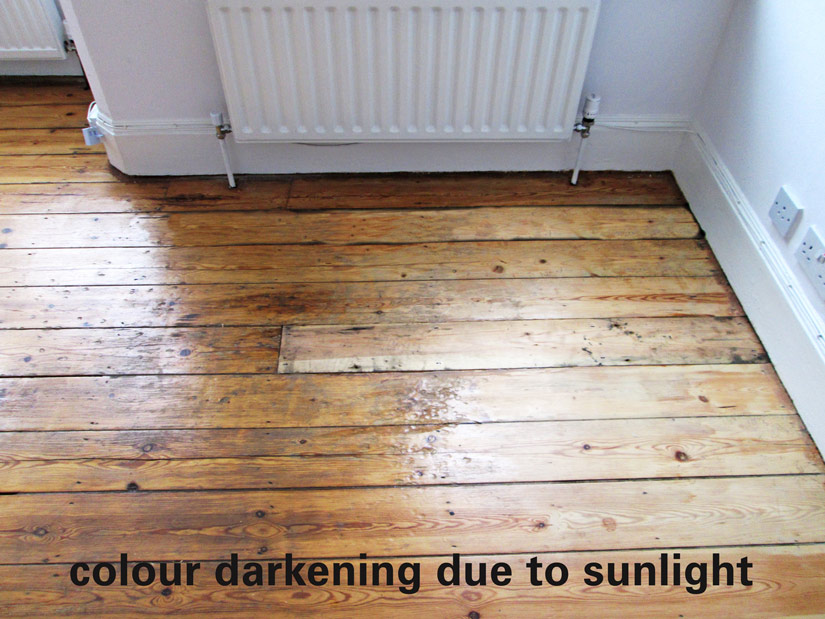Back to Maintenance & Care
How to Reduce Colour Changes in Your Wood Floor

As a natural material, wood flooring will inevitably experience some changes over time. The type of change depends on several factors, including the species of wood, the finish or stain applied, indoor climate conditions, and the level of care the floor receives. Colour changes are perfectly normal – just as time affects all natural materials – but the results can vary greatly depending on the circumstances.
The Main Cause of Colour Fading in Wood Floors
The biggest reason for colour change is sunlight exposure. UV rays can cause fading or darkening, depending on the type of timber. For most homeowners, fading is the most noticeable issue. Fortunately, there are several ways to reduce this effect. Simple steps such as using curtains, rugs, or smart furniture placement can block some of the sunlight. However, the most effective solution is to choose a floor finish with built-in UV protection, which reduces exposure and helps keep your wood floor looking vibrant for much longer.
How Wood Species and Finishes Affect Colour Change
Not all types of timber react to sunlight in the same way. Traditional European species, such as oak, typically fade but may also develop warmer golden and amber tones over time. In contrast, many exotic hardwoods tend to darken with age – a common effect in species like Brazilian Cherry and Tigerwood.
Flooring grades also influence how much your floor changes over the years. For example, prime grade timber often shows less variation in colour compared to rustic grades, though it comes at a higher cost. As with most things, quality comes at a price.

Stains can help control colour changes. Dark-stained floors, which are especially popular in modern flooring trends, usually retain their appearance better over time and show less noticeable fading compared to lighter shades.
Unfinished vs. Pre-finished Floors: If you are buying a new floor, it’s worth considering UV protection. Many homeowners prefer site-finished floors, but pre-finished wood usually comes with a strong factory-applied coating. These coatings often contain aluminium oxide crystals and UV-cured urethane, which provide excellent resistance to fading. While site-applied finishes typically have a warranty of 3–5 years, pre-finished floors can offer coverage of 5–25 years. However, pre-finished flooring also comes with some limitations that should be weighed against its benefits.
The Type of Finish: The finish you choose also affects how your floor ages. Oil-based products tend to add a yellowish tint over time, while water-based finishes are better at preserving the wood’s natural colour. Additionally, the sheen level of a finish influences how light interacts with your floor. Gloss and semi-gloss finishes reflect more light but may make fading more visible, while satin and matte finishes hide imperfections better but often darken gradually. For traditional hardwood species that fade, a glossy finish is not ideal – but for exotic woods that darken, satin or matte finishes may actually complement the natural change.

Achieving the Perfect Look for Your Wood Floor
Finding the ideal colour and finish for your wood floor can be challenging, even for professionals. After all, beauty is subjective, and every homeowner has a different vision. That said, some combinations are more reliable if you want your floor to age gracefully. For example, oak is one of the most versatile species, known for balancing durability with natural beauty.
If you prefer a darker floor with minimal fading, a dark stain combined with an oil finish that includes UV protection is a solid choice. On the other hand, if you want a lighter look with less darkening over time, a water-based polyurethane finish with UV protection – especially in a glossier sheen – can help maintain brightness for years to come.
And remember, nothing is permanent. If you ever feel unhappy with the look of your floor, it can be sanded and refinished to achieve a new style that better suits your taste.
Final Thoughts on Reducing Wood Floor Colour Change
Colour change in wood flooring is natural and unavoidable to some extent, but with the right approach, you can minimise fading, darkening, and uneven tones. By choosing the right wood species, applying UV-protective finishes, and following good maintenance practices, you’ll ensure your floor ages gracefully and retains its beauty for years to come. And if the colour is no longer to your taste, remember that professional sanding and refinishing can give your floor a completely new look.
Quick Tips to Preserve Your Floor’s Colour
- Choose water-based finishes with UV protection to limit fading and yellowing.
- Rotate rugs and furniture regularly to prevent uneven colour patches.
- Opt for darker stains if you want a floor less prone to noticeable fading.
- Use curtains or blinds to reduce direct sunlight exposure.
- Select hardwood species like oak that age more evenly over time.
FAQs About Wood Floor Colour Change
Why does my wood floor change colour over time?
The main cause is sunlight exposure. UV rays can fade or darken wood depending on the species. Other factors include the type of finish, stain, and overall maintenance.
Which wood species fades the least?
Oak is one of the most stable and popular choices. Exotic woods like Brazilian Cherry and Tigerwood often darken, while lighter European woods tend to fade more quickly.
Can I stop my wood floor from fading completely?
No, but you can slow down the process. Using UV-protective finishes, curtains, rugs, and careful furniture placement will reduce exposure and help preserve the floor’s colour longer.
Does refinishing restore the original colour of wood floors?
Yes. Sanding and refinishing remove the old finish and allow you to restain the floor in your preferred shade, essentially giving you a fresh start.